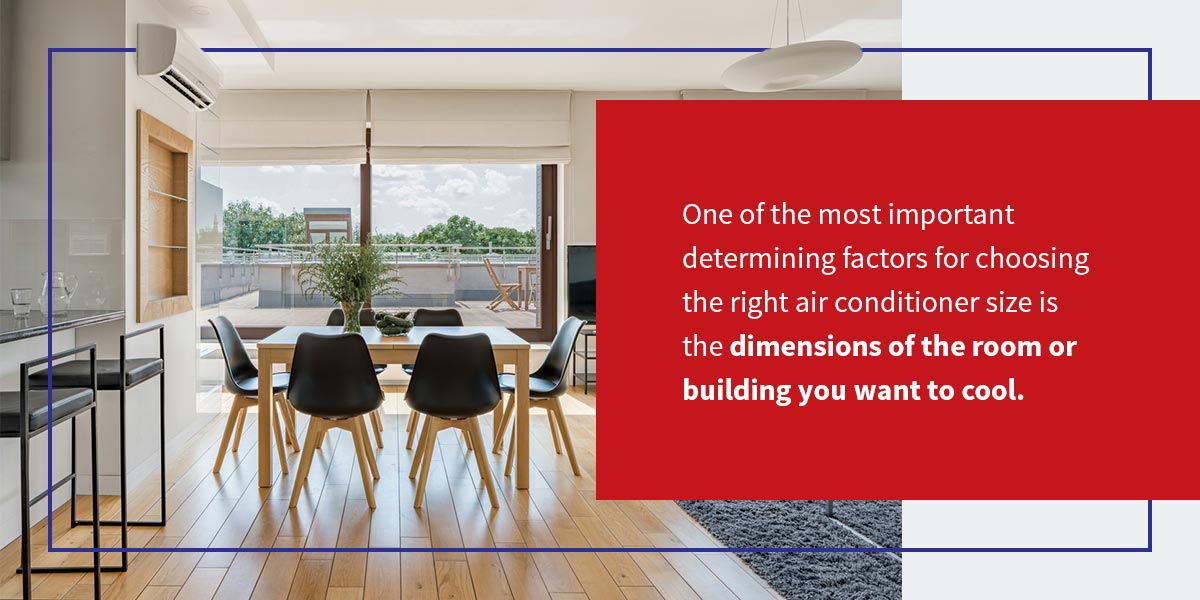Picking the Right Size Air Conditioners

In the hot summer months, we rely on our air conditioners to keep spaces cool and comfortable for everyone inside. And many of us don’t give our air conditioners much thought — that is, until they’re not working properly. If it’s time to replace your air conditioner, you may wonder what size AC unit you need.
Understanding how to determine what size AC to get can help you make the best choice for your home. Our AC unit size guide has everything you need to know.
Air Conditioner Sizing
So, what do we mean when we talk about the size of an air conditioner? It doesn’t mean the physical dimensions or measurements of the unit itself, although in certain instances this may be a concern, such as making sure a window unit fits in the desired window frame. Generally, when we talk about air conditioner size, it’s referring to the cooling capacity or the power of the machine to keep your space cool and comfortable most efficiently.
How Are AC Units Measured?
Most commonly, you’ll see air conditioning units with a listed measurement in BTUs. This acronym stands for British Thermal Units and is a measurement of the amount of heat an AC unit can remove from a space. BTUs are also a standard measurement for heating systems. When the term originated, one BTU was the measurement of heat required to raise one pound of liquid water by one degree Fahrenheit.
Another unit you may have heard when discussing air conditioners is tonnage. This term is related to BTUs, although not quite as common today. The tonnage comes from a time when cooling systems were simply blocks of ice instead of sophisticated air conditioning machines, and the ice was measured in weight.
AC tonnage, then, compares the amount of BTUs required to melt a ton of ice over a 24-hour period. Whether the units you’re looking at are measured in tonnage or BTUs, you can measure your space and consider all of the other necessary factors to determine the right size unit for you.
Factors That Go Into Determining AC Size
One of the most important determining factors for choosing the right air conditioner size is the dimensions of the room or building you want to cool. A larger space will naturally require more power to keep cool and remove an appropriate amount of humidity. But the size of the building isn’t necessarily the only factor that determines the size of AC you should get. Here are some other factors to consider when deciding on what size AC you need:
- Ceiling heights
- Types and styles of roofing materials
- Insulation type and quality in the home
- Number and sizes of windows in the space
- Heat transfer ratings between walls
- Climate and sun exposure
- If the area includes a kitchen
Why Does Air Conditioning Size Matter?
When you need an AC unit now, picking the right size air conditioner might seem like a bit too much detail to care about. Why does it matter to get the size right? Can’t you just use any air conditioner for your home? There are many benefits to choosing the correct size of air conditioner for your space and your needs, and choosing incorrectly can mean that your space won’t be cooled as efficiently and effectively.
Choosing an air conditioning unit that’s too small for your space means that it will likely run constantly and the space won’t ever feel cool enough. This results in uncomfortable temperatures inside the home and higher energy bills from a system that’s working harder than it should. It may also result in uneven cooling throughout the house. Your unit may even need more frequent repairs or need to be replaced sooner than usual due to its working overtime.
On the flip side of this, using an air conditioning unit that’s too large for the space can also be detrimental. You might think this wouldn’t matter, as having a larger size air conditioner is sure to keep any space cool, right? The truth is that if your unit is too large for your space, it’s more likely to cool the space quickly and then shut off.
The problem with this is that this quick on-and-off cycling is hard on the unit and can lead to frequent repair jobs and needing a full replacement much sooner than normal. The other downside to this frequent on-off cycling is that while the air may be cooled, the unit doesn’t have enough time to remove the right amount of humidity to feel comfortable. So, you may be left with rooms that feel cool but damp or have troubles with mold growth down the road.
How to Measure What Size AC You Need
To ensure you get the right air conditioning unit for your home, start by measuring the space your unit will be cooling and follow these steps:
- Measure the length and width of each room to be cooled.
- Multiply the length by the width to get the square footage of each room. Add the rooms together if the AC unit will be responsible for cooling multiple rooms.
- Take the total square footage to be cooled and multiply that number by 20 BTUs. This result will give you a good starting point for a minimum size air conditioner that you’ll need, as measured in BTUs.
Of course, finding the right AC unit for you does require additional considerations to square footage, as we mentioned, but this is a great place to start. Consider your home style and the climate for your area as you make your choice. Consulting with a professional may be your best bet, as they have the knowledge and experience to help you make the best decision for your home and family.
Find Your Next Air Conditioner With Metro Services HVAC
At Metro Services HVAC, our trained team is experienced and knowledgeable in all things HVAC. We know what it takes to choose the right size air conditioner for your space and can help you make the right selection. Put your trust in the professionals at Metro Services HVAC to find the right air conditioner for you.
Whether you’re installing a new AC unit, need maintenance and repairs or need to have your current unit replaced, we can help. Contact us today for a free estimate or to get started with your new AC unit!


